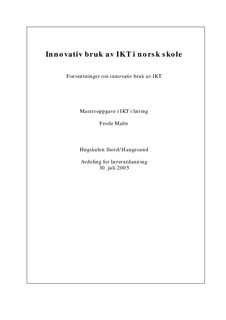| dc.description.abstract | The Norwegian Government’s massive focus on ICT within schools has changed the lectures, the pupils, the teachers and the learning environment over the later years. School buildings have been modernized with wireless networks, computers and video projectors are installed to an extent that is unique even in a global perspective. Simultaneously, large international studies show that Norwegian pupils have a low level of knowledge within several subjects compared to pupils in equally developed countries. The decline - especially in science subjects - is obvious, and occurs at the same time as the learning methods change and ICT is more used than ever. It is difficult to prove if there are any links between new ways of working, the introduction of ICT-methods, and the pupils’ skills.
The purpose of this study has been to find answers to whether a great competency to change of methods creates varying conditions for how ICT is used in the teaching situation. The qualitative study has been performed amongst principals, inspectors and teachers from 4 different secondary schools in the counties of Hordaland and Rogaland. The schools researched in this study were selected on the basis of high learning standards and great competency to change of methods. The perspective of this study is on the teachers’ role, the possibility to find arguments for the didactic decisions taken.
The schools included in the study are analysed on the basis of two theoretical models; a didactic relation model and an organisational model. The relation model can be used to describe relations between the schools’ learning goals, content, methods, evaluation, framework, and participants. The organisational model (Dahlin) is based on values, structures, relations, strategies, and environment. Consecutively these factors make up the basis used to classify the schools. The study shows that the use if ICT is approximately equal in all four schools, independent of their basis when they start using the technology and the leaders’ view on technology. When questions were asked whether ICT gives a better education that leads to an increased learning outcome, there is only a minority of teachers who answers yes. But ICT may give a valuable supplement to the lessons. The science and math teachers are against the use of ICT, as they claim that it disturbs each subject’s distinctive character.
Based on the general resistance against ICT in the schools, there are reasons to believe that it is difficult to use of ICT as a catalyst for organisational changes. This view is also supported by Becta and analysis made by OECD. | en |
